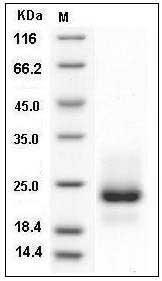-
Product Name
Human TRAIL R1/CD261/TNFRSF10A (His Tag) recombinant protein
- Documents
-
Description
Tumor necrosis factor receptor superfamily, member 10a (TRAIL R1), also known as TRAIL receptor 1 (TRAIL R1) or CD261 antigen, is a member of the TNF-receptor superfamily. This receptor is activated by tumor necrosis factor-related apoptosis inducing ligand (TNFSF10/TRAIL), and thus transduces cell death signal and induces cell apoptosis. Studies with FADD-deficient mice suggested that FADD, a death domain containing adaptor protein, is required for the apoptosis mediated by this protein. TRAIL R1/CD261/TNFRSF10A serves as a receptor for the cytotoxic ligand TNFSF10/TRAIL. The adapter molecule FADD recruits caspase-8 to the activated receptor. The resulting death-inducing signaling complex (DISC) performs caspase-8 proteolytic activation which initiates the subsequent cascade of caspases (aspartate-specific cysteine proteases) mediating apoptosis. TRAIL R1 can promote the activation of NF-kappa-B. TRAIL R1/CD261/TNFRSF10A induces apoptosis of many transformed cell lines but not of normal tissues, even though its death domain-containing receptor, DR4, is expressed on both cell types.
-
Protein short names
APO2; DR4; TNFRSF10A; TRAIL R1; CD261; TRAILR1; TRAILR-1; MGC9365
-
Uniprot ID
O00220
-
Source/Expression Host
Human Cells
-
Expression Plasmid/cDNA
A DNA sequence encoding the human TNFRSF10A (NP_003835.2) extracellular domain (Met 1-Asn 239) was expressed, fused with a polyhistidine tag at the C-terminus.
-
Protein Species
Human
-
Molecular weight
The secreted recombinant human TNFRSF10A consists of 142 amino acids and has a predicted molecular mass of 15.7 kDa. As a result of glycosylation, rh TNFRSF10A migrates as an approximately 24 kDa band in SDS-PAGE under reducing conditions.
-
Purity
> 92 % as determined by SDS-PAGE
-
Activity
Measured by its ability to inhibit TRAIL-mediated cytotoxicity using L‑929 mouse fibroblast cells treated with TRAIL.
The ED50 for this effect is typically 50-200 ng/ml in the presence of 20 ng/ml Recombinant Human TRAIL/TNFSF10. -
Validations

Human TRAIL R1 / CD261 / TNFRSF10A Protein (His Tag) SDS-PAGE
Related Products / Services
Please note: All products are "FOR RESEARCH USE ONLY AND ARE NOT INTENDED FOR DIAGNOSTIC OR THERAPEUTIC USE"
